Analyzing Social Media Lawsuits Across the U.S.
- Last Updated: June 12th, 2025

Attorney Jessica Paluch-Hoerman, founder of TruLaw, has over 28 years of experience as a personal injury and mass tort attorney, and previously worked as an international tax attorney at Deloitte. Jessie collaborates with attorneys nationwide — enabling her to share reliable, up-to-date legal information with our readers.
Legally Reviewed
This article has been written and reviewed for legal accuracy and clarity by the team of writers and legal experts at TruLaw and is as accurate as possible. This content should not be taken as legal advice from an attorney. If you would like to learn more about our owner and experienced injury lawyer, Jessie Paluch, you can do so here.
Fact-Checked
TruLaw does everything possible to make sure the information in this article is up to date and accurate. If you need specific legal advice about your case, contact us by using the chat on the bottom of this page. This article should not be taken as advice from an attorney.
Key takeaways:
- Social media lawsuits, including suits involving states and large groups of individuals, are emerging as a significant legal frontier.
- The range of social media lawsuit claims includes issues related to privacy, addiction, and harmful content, particularly impacting the well-being of youth.
- Litigating social media cases involves navigating unique challenges due to the digital nature and current Internet law frameworks.
Overview Of Social Media Lawsuits
On this page, we’ll discuss an overview of social media lawsuits, the types of lawsuits against social media companies, potential damages available in social media litigation, and much more.
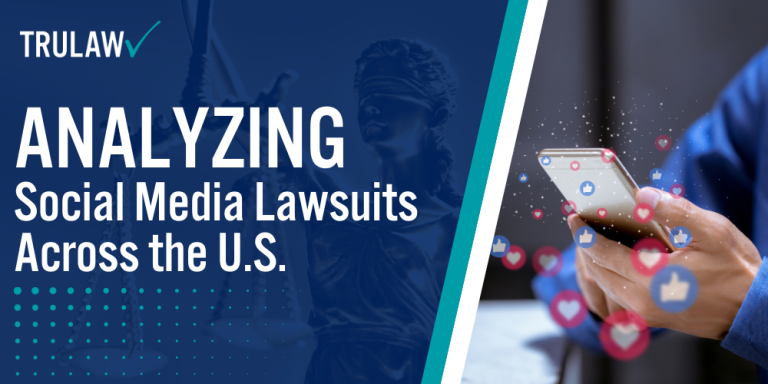
Intro To Social Media Lawsuits
Social media platforms have faced increasing scrutiny and legal challenges in recent years due to various issues.
Here are some of the most notable types of social media lawsuits:
- Data Privacy Lawsuits: These lawsuits allege that social media companies mishandled user data or failed to protect it from unauthorized access.
- Content Moderation Lawsuits: These cases involve claims that platforms either failed to remove harmful content or wrongfully censored user speech.
- Addiction and Mental Health Lawsuits: These lawsuits argue that social media platforms are designed to be addictive and can cause mental health issues, particularly in younger users.
If you or a loved one has been harmed by the actions or negligence of a social media company, you may be eligible to pursue compensation.
Contact TruLaw using the chat on this page to receive a free case evaluation and determine if you qualify to file a social media lawsuit today.
Table of Contents
Types of Legal Claims Arising from Social Media Use
The legal landscape of social media is rapidly evolving as users and legal professionals grapple with the challenges these platforms present.
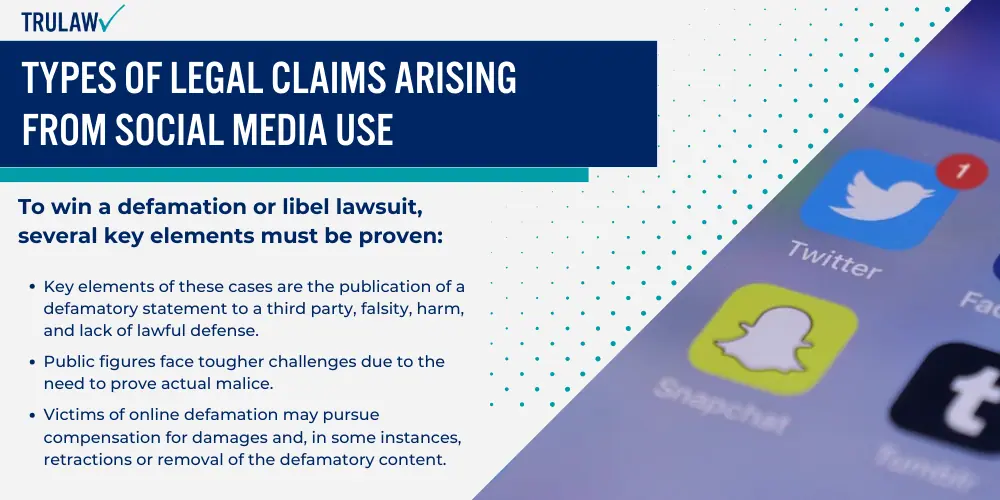
Claims range from personal reputation damage to large-scale data privacy breaches.
Defamation and Libel Lawsuits on Social Platforms
Defamation claims arise when a false statement is made on social media and results in harm to someone’s reputation.
Similarly, libel involves publishing such statements in written form, including online.
To win a defamation or libel lawsuit, several key elements must be proven:
- Key elements of these cases are the publication of a defamatory statement to a third party, falsity, harm, and lack of lawful defense.
- Public figures face tougher challenges due to the need to prove actual malice.
- Victims of online defamation may pursue compensation for damages and, in some instances, retractions or removal of the defamatory content.
- Free case review services often help to assess the viability of such lawsuits.
Intellectual Property Infringement in Social Media Posts
Intellectual property (IP) lawsuits on social media pertain to unauthorized use of copyrighted materials, trademarks, or trade secrets.
Here’s how social media posts can infringe on intellectual property:
- Infringement can result from sharing copyrighted images, videos, text, or music without permission.
- Creators can seek injunctions, monetary damages, and, potentially, profits made from the unauthorized use.
- The defense might involve fair use or obtaining a license post-factum.
- Meta and other social media platforms often implement automated systems to detect and prevent IP infringement.
Privacy Violations and Data Breaches by Social Networks
Privacy violations and data breaches encompass the unauthorized use of a user’s personal information or failure to protect user data.
Here are some of the ways social networks can be involved in privacy violations and data breaches:
- Personal information might be collected, shared, or sold without explicit consent.
- Cases may focus on data breaches where user information was compromised due to inadequate security measures.
- A class action lawsuit may occur when multiple users are affected by the same violation.
- Companies often face hefty penalties for not adhering to data protection laws and regulations.
The implications of these claims are of great significance to individuals and the operation and regulation of social media platforms.
High-Profile Social Media Lawsuits in Recent Years
The legal landscape has been bustling with high-profile social media lawsuits where celebrities, politicians, and businesses have taken to the courts over various grievances.
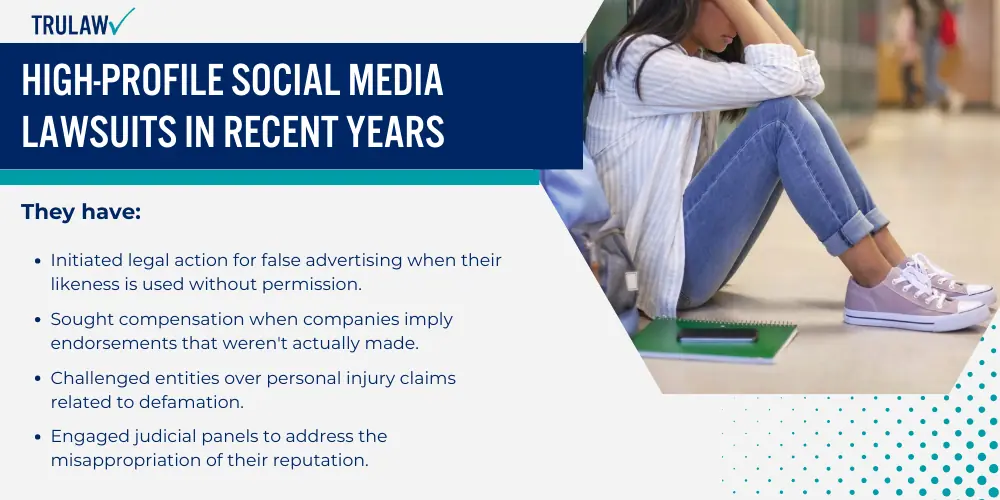
Celebrities Suing for False Advertising and Unauthorized Endorsements
Celebrities have been assertively protecting their image against unauthorized use.
They have:
- Initiated legal action for false advertising when their likeness is used without permission.
- Sought compensation when companies imply endorsements that weren’t actually made.
- Challenged entities over personal injury claims related to defamation.
- Engaged judicial panels to address the misappropriation of their reputation.
Politicians Filing Defamation Claims Over Tweets and Posts
In an era where a single tweet can spark widespread controversy, politicians are increasingly turning to the legal system to combat what they perceive as defamatory content.
This move comes as a means to protect their reputation and curb the spread of misinformation online.
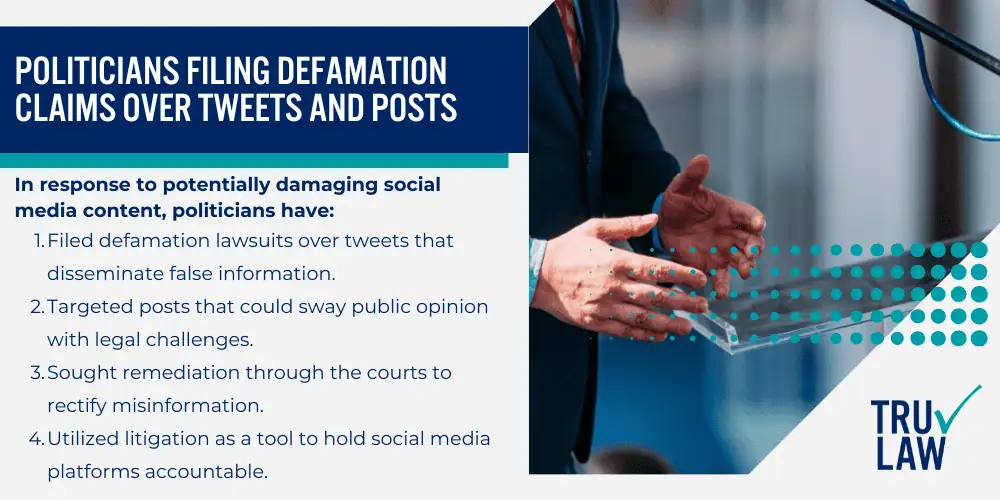
In response to potentially damaging social media content, politicians have:
- Filed defamation lawsuits over tweets that disseminate false information.
- Targeted posts that could sway public opinion with legal challenges.
- Sought remediation through the courts to rectify misinformation.
- Utilized litigation as a tool to hold social media platforms accountable.
Businesses Seeking Damages for Negative Reviews on Social Media
In the age of digital communication, a single negative review on social media can have far-reaching implications for a company’s brand image and bottom line.
As a result, some businesses have taken legal action against what they perceive as damaging and unfounded critiques.
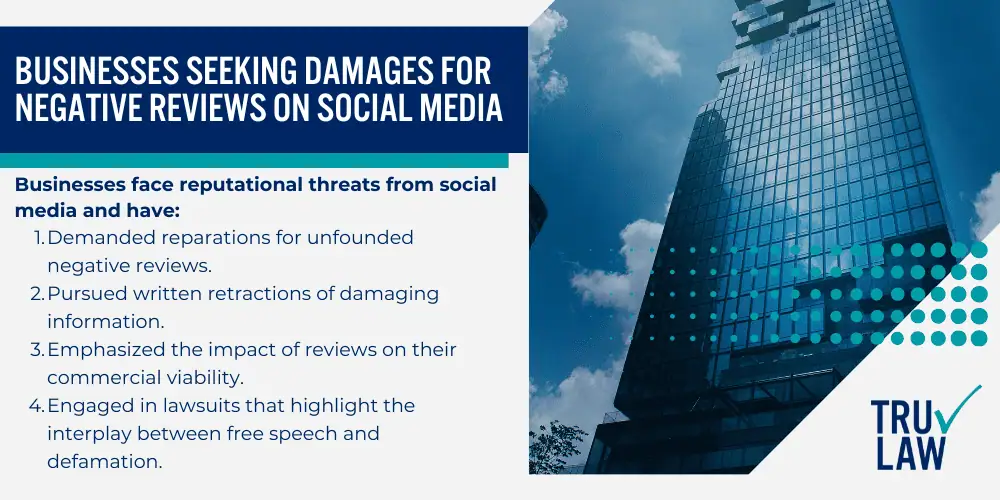
Businesses face reputational threats from social media and have:
- Demanded reparations for unfounded negative reviews.
- Pursued written retractions of damaging information.
- Emphasized the impact of reviews on their commercial viability.
- Engaged in lawsuits that highlight the interplay between free speech and defamation.
Legal Challenges in Litigating Social Media Cases
Litigating social media cases involves specific legal challenges related to jurisdiction, evidence authentication, and the application of existing protections for social media companies.
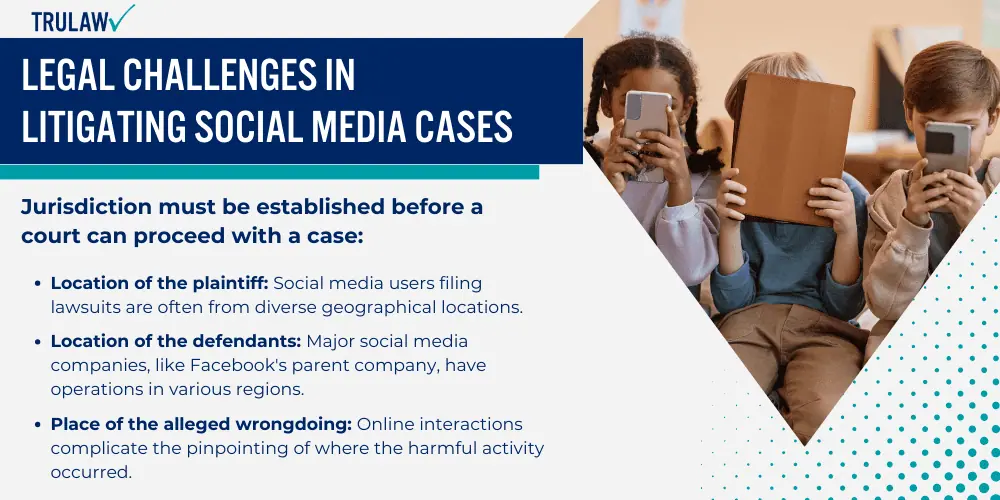
Determining Jurisdiction for Lawsuits Involving Online Activity
Determining jurisdiction in social media lawsuits can be particularly tricky because the parties involved might be located anywhere in the world.
Jurisdiction must be established before a court can proceed with a case:
- Location of the plaintiff: Social media users filing lawsuits are often from diverse geographical locations.
- Location of the defendants: Major social media companies, like Facebook’s parent company, have operations in various regions.
- Place of the alleged wrongdoing: Online interactions complicate the pinpointing of where the harmful activity occurred.
- Servers and infrastructure: The physical location of servers that host social media content could affect jurisdictional questions.
Authenticating Evidence from Social Media Accounts
Authentication of social media evidence is pivotal for a case’s success.
Courts must be convinced that the presented evidence is genuine and has not been altered:
- Dates and times: Accurately recording when content was posted can be critical.
- Account ownership: Linking the right individuals to the social media accounts in question.
- Chain of custody: Ensuring that social media data has been collected and preserved without tampering.
- Metadata analysis: Metadata can provide background information about the evidence, such as the device used, location data, and timestamps.
Social Media Lawsuits: Section 230 Immunity for Social Media Companies
Section 230 of the Communications Decency Act is a key piece of legislation that impacts lawsuits against social media companies.
This law offers a form of legal immunity, shaping how these platforms can be held accountable for the content that appears on their sites.
Social media companies frequently invoke Section 230 of the Communications Decency Act, which offers a form of legal immunity:
- User-generated content: Section 230 generally protects companies from being held liable for user-generated content.
- Editing and moderation: The extent to which a social media company edits or moderates content can impact its immunity status.
- Social media addiction lawsuits: Recent suits have challenged whether platforms’ design choices should be protected under Section 230.
- Evolving legal landscape: Judges and lawmakers continually reassess Section 230’s reach as the social media landscape changes, reflecting on cases from the past decade.
Strategies for Plaintiffs in Social Media Lawsuits
In social media lawsuits, plaintiffs must be strategic about collecting evidence, overcoming legal protections such as the CDA Section 230, and clearly demonstrating damages.
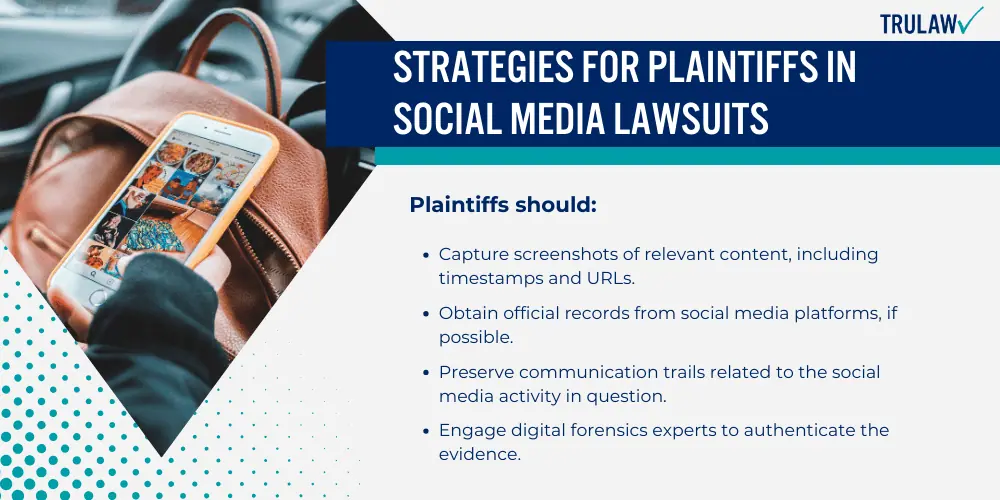
Preserving and Documenting Relevant Social Media Evidence
Preserving evidence is vital for a successful claim.
Plaintiffs should:
- Capture screenshots of relevant content, including timestamps and URLs.
- Obtain official records from social media platforms, if possible.
- Preserve communication trails related to the social media activity in question.
- Engage digital forensics experts to authenticate the evidence.
Identifying Anonymous Users and Overcoming CDA 230 Hurdles
Overcoming the shield provided by the Communications Decency Act (CDA) Section 230 is a challenge plaintiffs face.
They should:
- Accurately identify defendants, potentially using subpoenas to uncover anonymous users.
- Argue the platform’s algorithmic curation as outside the scope of CDA 230.
- Reference legal precedents that have successfully bypassed Section 230 protections.
- Present the case as a product liability claim when the social media platform’s design is in question.
Proving Damages Caused by Social Media Posts and Activity
Demonstrating damages is essential to substantiate a claim.
Here, the focus might be on:
- Showing medical treatment for harm caused by addictive social media features.
- Referencing studies on the addictive nature of social media and its impact on young adults.
- Documenting behavioral changes in users, especially young users, tied to social media use.
- Proving how certain designs exploit human psychology, leading to specific harm.
Best Practices for Reducing Social Media Legal Risks
Businesses and individuals looking to safeguard against social media lawsuits can take actionable steps to reduce their legal exposure.
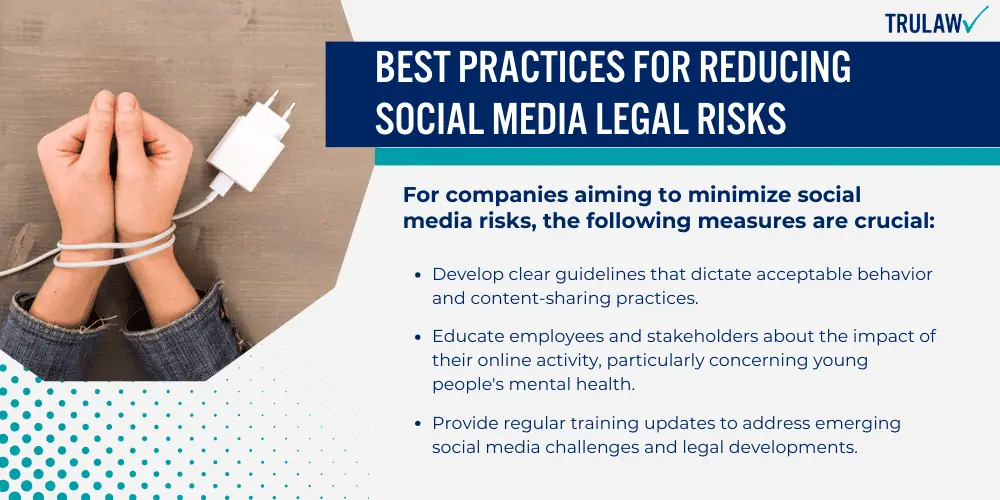
These steps are particularly significant in shielding the mental health of youth by fostering a safer online environment.
Implementing Strong Social Media Policies and Training Programs
Social media policies and training are essential lines of defense against legal issues.
For companies aiming to minimize social media risks, the following measures are crucial:
- Develop clear guidelines that dictate acceptable behavior and content-sharing practices.
- Educate employees and stakeholders about the impact of their online activity, particularly concerning young people’s mental health.
- Provide regular training updates to address emerging social media challenges and legal developments.
- Encourage responsible online communication to foster an environment that respects mental health awareness.
Monitoring and Moderating User-Generated Content
Vigilant monitoring of user-generated content is necessary to maintain a healthy online community.
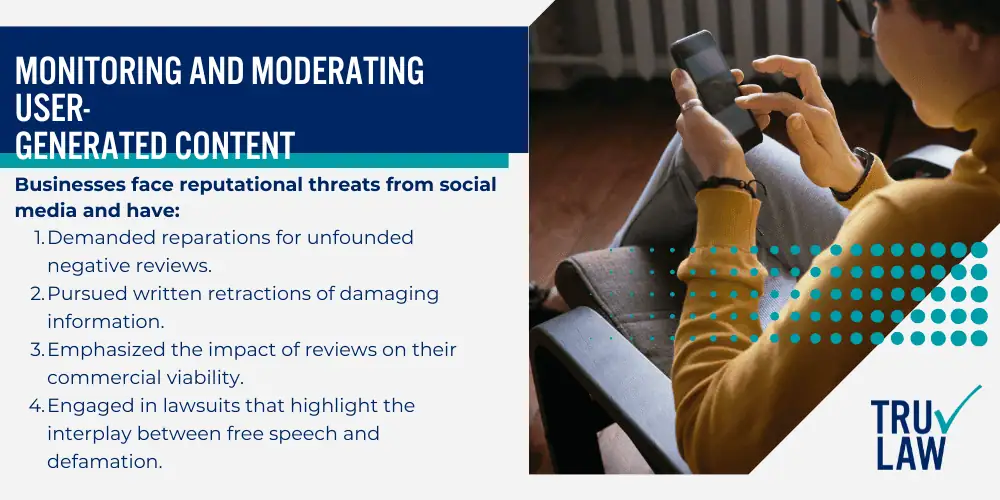
To protect all parties, especially susceptible populations like youth, from harmful content, consider these steps:
- Use automated tools to identify and flag potentially harmful or risky content.
- Employ a team of moderators to review flagged content and ensure it complies with both platform guidelines and mental health considerations.
- Engage with the community to encourage a culture of positive behavior and support.
- Update moderation policies regularly to adapt to new trends and regulatory changes.
Responding Promptly to Legal Complaints and Takedown Requests
Timely response to legal complaints is a cornerstone of effective social media risk management.
When dealing with legal challenges or takedown requests, these actions should be prioritized:
- Create a streamlined process for receiving and addressing complaints so that issues can be addressed swiftly.
- Document all interactions and decisions about the complaint or takedown notice.
- Train a dedicated team to handle these sensitive situations with keen attention to the implications for youth mental health programs.
- Review the underlying content carefully to assess the validity of the complaint and its potential impact on mental health crisis concerns.
The Future Landscape of Social Media Litigation
The evolving arena of social media litigation presents an array of new legal challenges and potential legislative changes, with a significant focus on the implications for youth mental health and addiction.
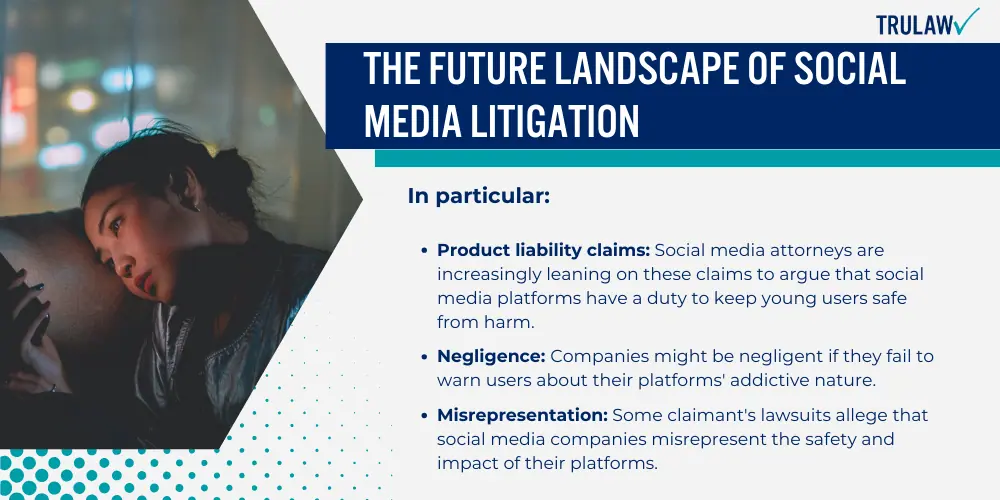
Emerging Legal Theories and Causes of Action in Social Media
Lawyers and policymakers observe evolving trends in litigation against social media companies, often sparked by public health concerns.
In particular:
- Product liability claims: Social media attorneys are increasingly leaning on these claims to argue that social media platforms have a duty to keep young users safe from harm.
- Negligence: Companies might be negligent if they fail to warn users about their platforms’ addictive nature.
- Misrepresentation: Some claimant’s lawsuits allege that social media companies misrepresent the safety and impact of their platforms.
- Unfair business practices: Given the growing awareness, there’s a push to hold companies accountable for practices considered harmful to youth mental health.
Potential Legislative Changes Impacting Social Media Lawsuits
The way lawsuits against social media companies are handled is on the cusp of significant change.
New laws and regulations are being debated that could fundamentally alter the legal landscape for social media litigation.
The legal framework around social media is in flux, with potential legislative changes on the horizon that could reshape social media litigation:
- Modifications to Section 230: This provision currently offers broad legal immunity to social media platforms, but there are active discussions about reforming it.
- New State Laws: Several states are contemplating laws that could make it easier to sue social media companies.
- Federal Regulatory Action: Federal agencies may step up with new regulations aimed at protecting consumers, particularly minors.
- International Influence: Legal trends overseas often influence U.S. legislation and could inspire new policies regarding social media use.
Balancing Free Speech and Accountability on Social Platforms
The tension between free speech and accountability is a challenging aspect.
Here are some factors at play:
- Algorithm transparency: Efforts to make social media algorithms more transparent could impact how platforms balance speech and responsibility.
- User control: Providing users, especially young ones, with more control over their experience could be a key factor in future litigation outcomes.
- Defining harm: Legally defining what constitutes harm on social media is complex but necessary for accountability.
- Precedent-setting cases: As new litigation outcomes emerge, they could set precedents that favor free speech or accountability.
Notable Settlements and Verdicts in Social Media Cases
The landscape of social media litigation has seen significant legal decisions and settlements that impact how platforms operate and address user harm.
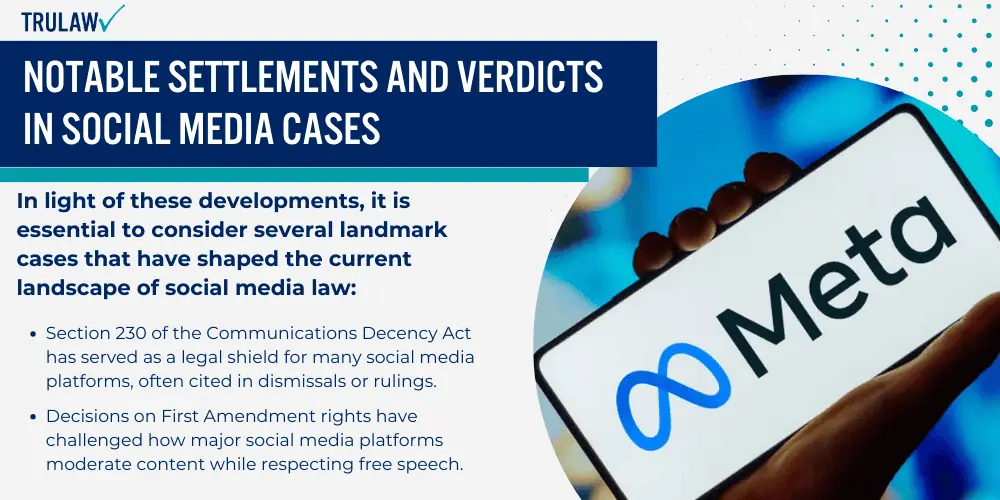
Precedent-Setting Rulings on Social Media Legal Issues
Courts have made pivotal decisions regarding social media and legal responsibilities.
Key rulings have spurred ongoing discussions about social media’s role in modern communication and its legal implications.
In light of these developments, it is essential to consider several landmark cases that have shaped the current landscape of social media law:
- Section 230 of the Communications Decency Act has served as a legal shield for many social media platforms, often cited in dismissals or rulings.
- Decisions on First Amendment rights have challenged how major social media platforms moderate content while respecting free speech.
- Courts have increasingly recognized social media’s role in contributing to mental health issues, prompting more nuanced legal scrutiny.
- There is a growing number of cases where social media companies are found liable for negligence, especially in the context of user protection.
Multimillion-Dollar Settlements in High-Stakes Social Media Suits
Monetary settlements from lawsuits against social media giants are in the spotlight, emphasizing the costly repercussions of inadequate user protection.
In a series of landmark cases, here are some notable examples that demonstrate the extent and variety of the issues at hand:
- Settlements have skyrocketed, with Meta Platforms Inc. facing a reported $725 million settlement for claims of designing features that addict children.
- Photo filter controversies have led to serious discussions about the role of social media in propagating unrealistic beauty standards, possibly contributing to eating disorders.
- Social media harm lawsuits have seen potential settlement amounts ranging from $10,000 to over $100,000, depending on the specifics of the case.
- Legal actions by school districts highlight the increased scrutiny of social media’s effect on young people, which can affect future platform policies.
Lessons Learned from Landmark Social Media Lawsuits
Landmark lawsuits have taught valuable lessons about social media’s influence and responsibilities to its users, especially the younger demographic.
Here’s how these legal challenges are shaping the platforms we use today:
- Social media companies are being held accountable for the content they host and the algorithms they use, which may impact user behavior.
- Legal challenges have prompted better protection measures for users, with a focus on preventing mental health issues and misuse.
- The impact on young people has been central in many cases, pushing for age-appropriate content and safeguarding measures on platforms.
- The outcomes of these cases are guiding new policies and regulations, both internally within companies and at the legislative level.
Ethical Considerations for Attorneys in Social Media Litigation
In the dynamic environment of social media litigation, attorneys must adhere to strict ethics while handling sensitive content and client conduct online.
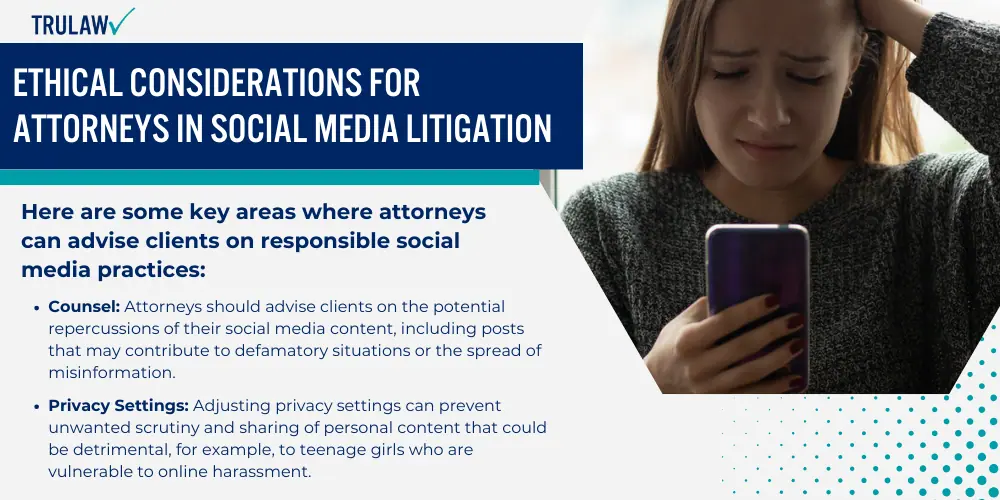
Advising Clients on Responsible Social Media Practices
Attorneys have a responsibility to guide clients through the sensitive online landscape to prevent the escalation of legal issues, especially those related to behavioral health and students’ mental health.
Here are some key areas where attorneys can advise clients on responsible social media practices:
- Counsel: Attorneys should advise clients on the potential repercussions of their social media content, including posts that may contribute to defamatory situations or the spread of misinformation.
- Privacy Settings: Adjusting privacy settings can prevent unwanted scrutiny and sharing of personal content that could be detrimental, for example, to teenage girls who are vulnerable to online harassment.
- Documentation: Encourage clients to document all social media interactions, which can be valuable evidence if litigation arises.
- Mental Well-being: Discuss the impact of social media on their mental health, particularly in cases related to bullying or suicidal ideation, ensuring they are aware of the gravity of online behavior.
Avoiding Conflicts of Interest and Maintaining Confidentiality
It’s paramount for legal professionals to avoid conflicts of interest and protect confidential information while using social media in litigation.
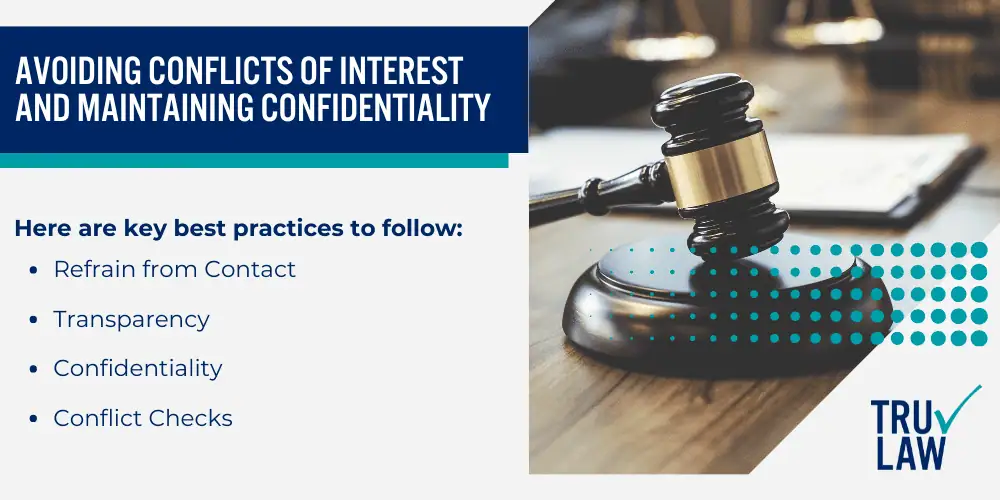
Here are key best practices to follow:
- Refrain from Contact: Direct contact with represented parties through social media should be avoided to uphold ethical standards.
- Transparency: Disclose representation when necessary if engaging with unrepresented adverse parties.
- Confidentiality: Guard client information with the utmost care, cognizant that breaches could lead to severe repercussions.
- Conflict Checks: Perform diligent conflict checks before engaging with parties or witnesses on social media platforms.
Navigating Professional Conduct Rules in Social Media Lawsuits
Attorneys must diligently follow professional conduct rules, ensuring their behavior is above reproach in the public domain of social media.
Here are some key areas to consider:
- Truthfulness in Statements: Avoid making false or misleading comments regarding legal services or outcomes.
- Advertising: Be mindful that social media profiles and interactions can be construed as advertising and must conform to ethical guidelines.
- Ex Parte Communications: Abide by restrictions on ex parte communication during proceedings, as social media interactions could inadvertently fall under this category.
- Jury Research: When conducting jury selection research, attorneys should avoid any interaction with potential or selected jurors on social media platforms to prevent misconduct allegations.
TruLaw: #1 Social Media Lawsuit Lawyers
TruLaw has emerged as a leading firm in addressing the legal challenges associated with social media’s impact on mental health.
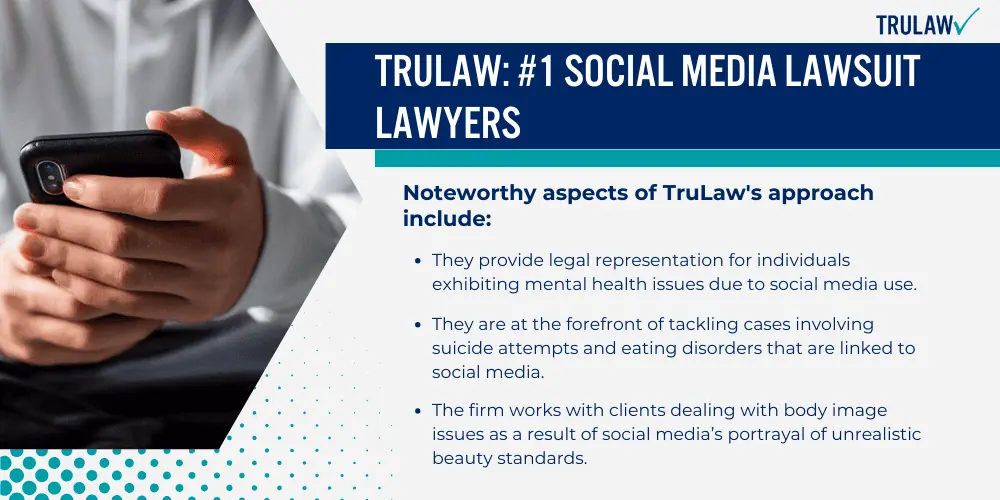
They exhibit a dedicated focus on cases related to social media-induced harm, specifically concerning TikTok teen addiction lawsuits.
Noteworthy aspects of TruLaw’s approach include:
- They provide legal representation for individuals exhibiting mental health issues due to social media use.
- They are at the forefront of tackling cases involving suicide attempts and eating disorders that are linked to social media.
- The firm works with clients dealing with body image issues as a result of social media’s portrayal of unrealistic beauty standards.
- Their expertise extends to handling social media challenges that often lead to hazardous behavior among youth.
TruLaw’s approach is tailored toward victims and their families who’ve faced the dark side of social networks.
With a solid track record, they have become synonymous with justice for those affected by social media’s adverse outcomes.
They stand out for their understanding of how platform features may contribute to addictive behaviors and related psychological issues.
Their work in this field is a testament to their commitment.
They aim to highlight the risks and enforce accountability within the social media landscape.
TruLaw maintains a strong position, advocating for regulation and corporate responsibility to protect vulnerable users, especially the younger demographic.
Social Media Harm Lawsuits Frequently Asked Questions
-
What are the typical compensations awarded in social media lawsuits?
Compensation in social media lawsuits often includes coverage for medical treatments and therapy for mental health conditions linked to platform use.
In some cases, punitive damages may also be awarded to discourage future harmful practices by social media companies.
-
What legal grounds are used to address mental health issues caused by social media platforms in lawsuits?
Lawsuits may argue negligence or failure to warn regarding the potential risks of social media use.
Additionally, they can claim violation of consumer protection laws if deceptive practices are involved.
-
What steps should be taken to sue a social media platform for causing harm?
First, document any harm suffered and gather evidence.
Then, consult with a legal professional to assess the validity of the claim and determine the best legal strategy for filing a lawsuit.
-
Is it possible to file a lawsuit against someone for sharing personal content on social media without consent?
Yes, it is possible to sue for sharing personal content without consent under privacy laws or, in some cases, intellectual property laws if the shared content is protected.
-
What evidence is needed to support a social media lawsuit claim in court?
Claims of social media addiction require documentation of the addiction itself, such as medical or psychological evaluations and evidence showing the impact it has had on the individual’s daily life and well-being.

Managing Attorney & Owner
With over 25 years of legal experience, Jessica Paluch-Hoerman is an Illinois lawyer, a CPA, and a mother of three. She spent the first decade of her career working as an international tax attorney at Deloitte.
In 2009, Jessie co-founded her own law firm with her husband – which has scaled to over 30 employees since its conception.
In 2016, Jessie founded TruLaw, which allows her to collaborate with attorneys and legal experts across the United States on a daily basis. This hypervaluable network of experts is what enables her to share the most reliable, accurate, and up-to-date legal information with our readers!
Additional Social Media Harm Lawsuits resources on our website:
Here, at TruLaw, we’re committed to helping victims get the justice they deserve.
Alongside our partner law firms, we have successfully collected over $3 Billion in verdicts and settlements on behalf of injured individuals.
Would you like our help?
At TruLaw, we fiercely combat corporations that endanger individuals’ well-being. If you’ve suffered injuries and believe these well-funded entities should be held accountable, we’re here for you.
With TruLaw, you gain access to successful and seasoned lawyers who maximize your chances of success. Our lawyers invest in you—they do not receive a dime until your lawsuit reaches a successful resolution!
AFFF Lawsuit claims are being filed against manufacturers of aqueous film-forming foam (AFFF), commonly used in firefighting.
Claims allege that companies such as 3M, DuPont, and Tyco Fire Products failed to adequately warn users about the potential dangers of AFFF exposure — including increased risks of various cancers and diseases.
Depo Provera Lawsuit claims are being filed by individuals who allege they developed meningioma (a type of brain tumor) after receiving Depo-Provera birth control injections.
A 2024 study found that women using Depo-Provera for at least 1 year are five times more likely to develop meningioma brain tumors compared to those not using the drug.
Suboxone Tooth Decay Lawsuit claims are being filed against Indivior, the manufacturer of Suboxone, a medication used to treat opioid addiction.
Claims allege that Indivior failed to adequately warn users about the potential dangers of severe tooth decay and dental injuries associated with Suboxone’s sublingual film version.
Social Media Harm Lawsuits are being filed against social media companies for allegedly causing mental health issues in children and teens.
Claims allege that companies like Meta, Google, ByteDance, and Snap designed addictive platforms that led to anxiety, depression, and other mental health issues without adequately warning users or parents.
Transvaginal Mesh Lawsuits are being filed against manufacturers of transvaginal mesh products used to treat pelvic organ prolapse (POP) and stress urinary incontinence (SUI).
Claims allege that companies like Ethicon, C.R. Bard, and Boston Scientific failed to adequately warn about potential dangers — including erosion, pain, and infection.
Bair Hugger Warming Blanket Lawsuits involve claims against 3M — alleging their surgical warming blankets caused severe infections and complications (particularly in hip and knee replacement surgeries).
Plaintiffs claim 3M failed to warn about potential risks — despite knowing about increased risk of deep joint infections since 2011.
Baby Formula NEC Lawsuit claims are being filed against manufacturers of cow’s milk-based baby formula products.
Claims allege that companies like Abbott Laboratories (Similac) and Mead Johnson & Company (Enfamil) failed to warn about the increased risk of necrotizing enterocolitis (NEC) in premature infants.
Here, at TruLaw, we’re committed to helping victims get the justice they deserve.
Alongside our partner law firms, we have successfully collected over $3 Billion in verdicts and settlements on behalf of injured individuals.
Would you like our help?
